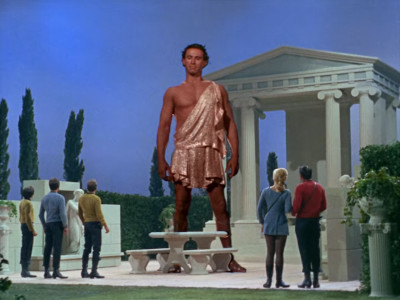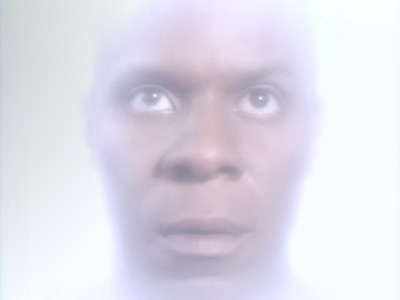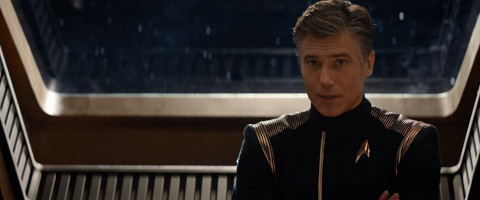The Degradation of God in Star Trek
The degradation of God into a highly evolved alien being, is a constant theme that joins all the Star Trek series, as I demonstrate in the following review.
In the episode of the original series, entitled "Who Mourns for Adonais?" (season 2, episode 2), the Enterprise's crew discovers that the pagan Gods worshipped by the ancient humans, are actually an alien species in possess of a highly advanced technology. The humans of the past, being unaware, were subdued by the alien technology that they interpreted as God's power. But Star Trek humans have finally achieved the technological progression that made them possible to defeat ancient Gods.

The plot of Who Mourns for Adonais? is forerunner of Roland Emmerich's movie Stargate.
In the fifth episode of the second season of the animated series, entitled "How Sharper than a Serpent's Tooth", the Enterprise stumbles upon Kukulkan, a legendary Mayan divinity in the shape of a winged snake, that came from the sky bringing knowledge. The Mayans built their pyramids and drew up the famous calendar thanks to the indications provided by Kukulkan.
According to Captain Kirk: we could be dealing with the basis of all those legends. A space traveler who visited Earth in primitive times
. Kukulkan kidnaps the officers of the Enterprise and confesses to them that he is the last survivor of an alien species extinct before the appearance of man on Earth. He wants to look after human beings, considered by him as children in need of a guide. The officers are then released thanks to the Enterprise's firepower. In the final dialogue, Captain Kirk says to the false God: you think of us as being small creatures [...]. Are we really that inferior to you?
and we've grown now. We don't need you anymore
.

In the fifth movie, entitled "The Final Frontier", a bizarre alien form acts like God to take advantage of the credulity of his faithful believers. The spell breaks when Captain Kirk points out: What does God make with a spaceship?

The creature called "Q", present in both the series The Next Generation and Voyager, is able to modify the physic's laws to his liking. In his first appearance, he rises himself as judge of the whole humanity. Although comparable to God in omnipotence, Q is debased by his childish behavior.

The Prophets of the series Deep Space Nine are aliens coming from another dimension (the "continuum"), that perceive time in a non-linear way, therefore they are aware of future events. The Prophets are worshipped as gods by the underdeveloped civilitation of Bajorans. The evil Pah-wraith are rebel aliens belonging to the same species of the Prophets, but they were cast out from the continuum by the latters. The Pah-wraith manifest as "spiritual" entities being able to take possess of the bodies of other species. They resemble the fallen angels (devils) of Abrahamic religions. The captain of the space station ("Emissary" of the Prophets for Bajorans), that will eventually drive back the Pah-wraith to their prison of fire, similarly to Jesus, is a human being conceived by means of divine intervention. Once he has completed his task, the captain becomes part of the continuum (that is, he ascends to heaven).

In parallel, the Vorta and the Jem'hadar obey slavishly to a shapeshifting species, the Changelings, considered as divine.
In the first two episodes of Star Trek: Voyager, the existence of the species Ocampa completely relies on the provvidential care of a misterious and compassionate entity called the Caretaker. For a thousand years, the Caretaker's help has literally rained down from the sky, creating a relationship of dependence that hinders the autonomous development of the Ocampas. None of the Ocampas has ever seen the Caretaker or communicated directly with him, but being devoted to him they try to interpret his will. Although the shape differs from the humanoid one, the presumed God proves to be a biological organism in all respects, long-lived but deadly, coming from another galaxy and possessing sophisticated technology.

In the episode of Star Trek: Enteprise entitled "Chosen Realm" (season 3, episode 12), gigantic spheres capable of distorting space, built by an unknown intelligence, are revered as the work of the Gods by an underdeveloped alien species, whose religious fanaticism will lead to self-destruction.

In the twelfth film of the saga, the Enterprise saves the primitive inhabitants of an alien planet from an impending volcanic eruption. The volcano is blocked by solidifying the magma, but during the incognito mission, the human spaceship is sighted by the primitive tribe who, stunned by this vision, will begin to worship the simulacrum of the Enterprise.

The degradation of God reaches paroxysm during the entire second season of Star Trek: Discovery and becomes explicit in the conversation that I report below:
Commander Burnham: «are you suggesting that some kind of divine intervention put those people on the planet?»
Captain Pike: «I assume you're familiar with Clarke's Third Law?»
Commander Burnham: «yes, in the 20th Century, Arthur C. Clarke said that any sufficiently advanced technology is indistinguishable from magic»
Captain Pike: «the law was debated by scientists and theologians alike and later reinterpreted to say 'Any sufficiently advanced extraterrestrial intelligence is indistinguishable from God'».
At the end of the season it turns out that the providential and prodigious events initially attributed to divinities, were actually carried out by the crew members themselves, thanks to the development of a technology that allows them to travel through time and prepare events at will.
Humans save themselves, they don't need God: the epilogue of the second season of Star Trek: Discovery is analogous to Christopher Nolan's movie Interstellar.

Finally, in Star Trek: Picard the legendary captain rises from the dead thanks to a special technology. The miracle of Jesus, on which Christianity is based, reproduced by technology.

The elevation of man to the degree of God implicitly corresponds to the degradation of God as an evolved biological organism: if God is nothing but a very advanced being, then man too can become like God.
This veiled Luciferian morality underlines the original sin of man.
The original text is in Italian language, special thanks to Roxana for the English translation.
